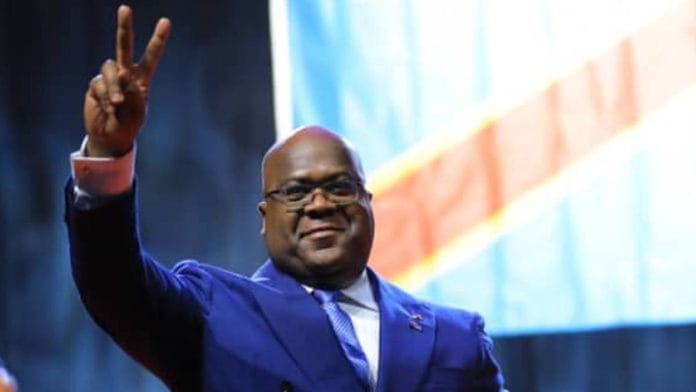New Delhi: In a bid to ease internal tensions in war-torn DRC, President Félix Tshisekedi has made a unique proposal to US President Donald Trump: trade minerals for military support.
With this, the Democratic Republic of Congo is also opening its vast minerals market to players other than China, which has been the dominant player in the mining sector there.
With the ongoing M23 rebel insurgency causing massive instability, Tshisekedi, in a letter last month, proposed mining opportunities for the US Sovereign Wealth Fund proposed by Trump, according to a report in The Wall Street Journal.
In return, Tshisekedi requested a “formal security pact” from Trump to help his military defeat the M23, a Rwandan-backed rebel group that has overrun DRC forces, UN peacekeepers and private mercenaries, capturing key cities in the resource-rich eastern region of the country.
The letter did not outline the specific nature of the military support sought but highlighted the critical role minerals play in industries such as technology and energy, noting their importance to US firms like Apple, Tesla and Intel.
“Our partnership would provide the US with a strategic advantage by securing critical minerals such as cobalt, lithium, copper and tantalum from the Democratic Republic of Congo,” the letter states.
The DRC is one of the world’s largest producers of these minerals, and its untapped resources are estimated to be worth trillions of dollars.
Also Read: China is waiting for Trump to falter—and step up to lead the world order
Shift from China
At present, Chinese companies dominate DRC’s mineral industry, with their operators reported to be running half of the mines in the country’s southern Katanga region, which is home to nine of the largest cobalt mining areas.
Former DRC president Joseph Kabila brokered several minerals-for-infrastructure agreements with China, although these deals have faced criticism for lacking transparency and not fulfilling their promises.
Tshisekedi’s government is now looking to diversify foreign investment, particularly from the US.
“Congo is eager to collaborate with the Trump administration to resolve the conflict and halt the flow of conflict minerals through Rwanda. It is in both our interests for American companies, such as Apple and Tesla, to purchase minerals directly from the DRC, unlocking the potential of our mineral wealth for the benefit of the entire world,” the WSJ quoted a spokesperson for Tshisekedi as saying.
The US has reportedly shown interest in the proposal, with a state department spokesperson emphasising the importance of DRC’s critical minerals for US technology and defence industries.
In addition to the proposed military cooperation, the DRC is looking to establish a long-term economic partnership with the US, offering access to its mines and infrastructure, including ports for mineral exports.
Tshisekedi’s proposal aligns with Trump’s “America First” approach to foreign policy, which has emphasised securing access to natural resources. Talks between the DRC and US government regarding mineral access are now reported to be on.
Strategic interests
The DRC’s negotiations come at a time of escalating violence in the region. The M23 rebel group has taken control of key cities, including Goma and Bukavu, causing widespread displacement and fatalities.
While the UN and other peacekeeping forces are stationed in DRC, they have struggled to contain the rebels. The conflict is compounded by tensions with neighbouring Rwanda, which is accused by the UN and US of supporting the M23. Rwanda has denied the charge.
DRC’s armed forces have struggled to control the escalating violence, exacerbated by corruption and a lack of resources.
Tshisekedi’s offer is a direct appeal to Trump’s transactional approach to foreign policy, which has focused heavily on securing deals that benefit American economic interests.
Last month, the Africa Business Council, an international organisation advocating for African business interests, reportedly sent a letter to US Secretary of State Marco Rubio, urging the nation to invest in the DRC’s untapped resources.
The letter, representing Congolese senator Pierre Kanda Kalambayi, who chairs the DRC’s senate committee on defence, security, and border protection, proposed a long-term economic and security partnership that would benefit both countries.
The proposal suggested that US defence and technology companies be granted access to DRC’s mines, as well as access to a port for exports. Additionally, the plan called for the creation of a joint mineral stockpile to be shared by both nations. In exchange, the US would provide training and equipment for DRC forces, and direct access to US military support in the DRC.
The offer comes at a time when Tshisekedi is also in talks with Erik Prince, American businessman and investor and founder of the controversial private security company formerly known as Blackwater.
Prince, a Trump ally, could potentially assist the DRC in managing its mining revenues, providing security for tax collection, and offering expertise in curbing fiscal evasion by mining companies.
“Tantalum, extracted from coltan, and cobalt are critical components of smartphones and laptops, used by major American companies like Apple, HP and Intel. Lithium, meanwhile, is central to electric vehicle batteries,” Tshisekedi wrote in his pitch, according to the WSJ.
Tesla CEO Elon Musk, who often refers to lithium as “the new oil”, has also shown a keen interest in securing these crucial minerals, making the DRC an attractive partner for US high-tech firms.
Meanwhile, the US already has significant investments in African infrastructure projects, such as the Lobito Corridor, an effort to build railways and ports for exporting DRC’s minerals through neighbouring Angola.
(Edited by Nida Fatima Siddiqui)
Also Read: US has stepped back from Russia-Ukraine war. India has a small window to export arms to Europe






